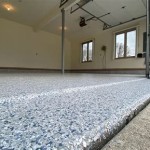How To Clean Oil Off Garage Floor Concrete: A Comprehensive Guide
Oil spills on your garage floor are an unfortunate reality for many car owners. But fret not – a greasy floor doesn’t have to be a permanent eyesore. With the right approach and cleaning supplies, you can effectively remove oil stains and restore your garage floor to its pristine condition. This guide will provide you with a step-by-step approach to cleaning oil off concrete, ensuring a safe and efficient process.
1. Preparation: Safety First
Before starting the cleaning process, it’s essential to prioritize safety. Oil spills can be slippery, and the cleaning agents used might be harsh. Wear protective gear such as gloves, eye protection, and a mask to prevent skin and respiratory irritation. Ensure good ventilation in your garage, as fumes from the cleaning agents can be harmful. It's also recommended to wear old clothes you don't mind getting dirty, as spills are common during the cleaning process.
2. Absorbing the Excess Oil
The first step is to absorb as much of the excess oil as possible. This prevents the oil from soaking deeper into the concrete, making the cleaning process more challenging. Use absorbent materials like kitty litter, sawdust, or an oil-absorbing mat. Spread the absorbent material over the oil spill and allow it to sit for a while, ideally for several hours or overnight. The absorbent material will draw the oil into itself, making the cleaning more manageable. Once the absorbent material has absorbed as much oil as possible, carefully dispose of it. Do not discard it in your regular trash, as this can lead to environmental contamination. Check with your local waste management center for safe disposal options.
3. Cleaning Agents for Oil Stains
After absorbing the excess oil, you'll need a cleaning agent to tackle the remaining stain. Several options are available, each with its pros and cons.
- Commercial Degreasers: These are readily available at hardware stores. They are specifically formulated to break down oil and grease, making them effective for deep cleaning. However, some degreasers can be harsh on concrete, so always follow the manufacturer's instructions carefully.
- Baking Soda: This kitchen staple is a surprisingly effective cleaning agent for oil stains. Combine baking soda with water to form a paste, apply it to the stain, and let it sit for about 30 minutes. The baking soda will absorb the oil and help break down the stain.
- Dish Soap: A common household item, dish soap is a decent option for cleaning oil stains. Mix a small amount of dish soap with warm water, apply it to the stain, and scrub with a stiff brush. This method is less effective than degreasers, but it's a safer alternative for delicate concrete surfaces.
- White Vinegar: Acidic in nature, white vinegar can help break down oil stains. Apply white vinegar to the stain, let it sit for a few minutes, and then scrub with a brush. This method works best for fresh stains.
The best cleaning agent for your situation will depend on the type of oil, the severity of the stain, and the condition of your concrete floor. Consider the pros and cons of each agent before making your choice.
4. Applying the Cleaning Agent
Once you've selected your cleaning agent, apply it liberally to the oil stain. Use a brush or a sponge to scrub the stain vigorously. For stubborn stains, you might need to repeat the application and scrubbing process several times. The key is to work the cleaning agent into the stain, loosening the oil and allowing it to lift from the concrete surface.
5. Rinsing and Drying
After scrubbing with the cleaning agent, rinse the area thoroughly with clean water. This removes any residual cleaning agents and ensures the oil has been completely cleaned. It’s important to remove all cleaning agent residues, as they can damage the concrete over time. Use a hose or bucket of water to rinse the area effectively. Depending on the cleaning agent and the severity of the stain, multiple rinses might be necessary. After rinsing, allow the concrete floor to dry completely. This might take several hours, depending on the climate and the size of the stain.
6. Preventative Measures
Once you've successfully cleaned the oil stain, it's essential to take steps to prevent future spills. Consider using a floor mat or drip pan under your car to catch any leaks or drips. Store oil products in sealed containers and avoid overfilling them. Regular inspection and maintenance of your car can also help prevent oil leaks.
By following these steps, you can effectively remove oil stains from your garage floor and prevent future spills. Remember to prioritize safety, choose an appropriate cleaning agent, and be patient throughout the cleaning process.

Painting Your Garage Floor Expert Advice Doors 4 You

Concrete Garage Floor Stain Removal R Homeimprovement

Apartment Carpark Oil Stain Removal The Eaters

How To Remove An Oil Stain From Concrete

Getting Floor Oil Stain Out The Garage Journal

How To Maintain And Clean Your Or Polyaspartic Garage Floor

Garage Floor Paint Vs Floors Agf
Related Posts








